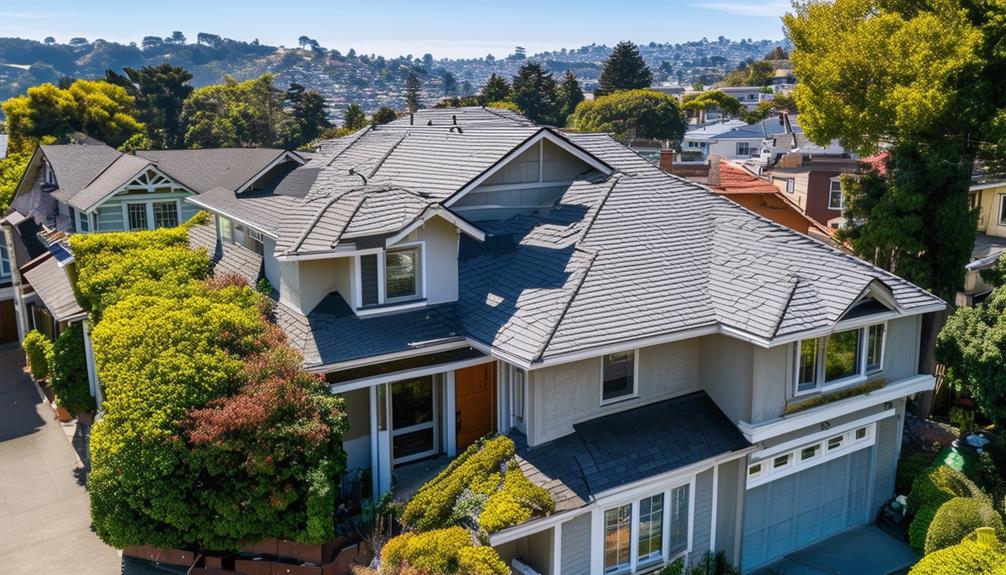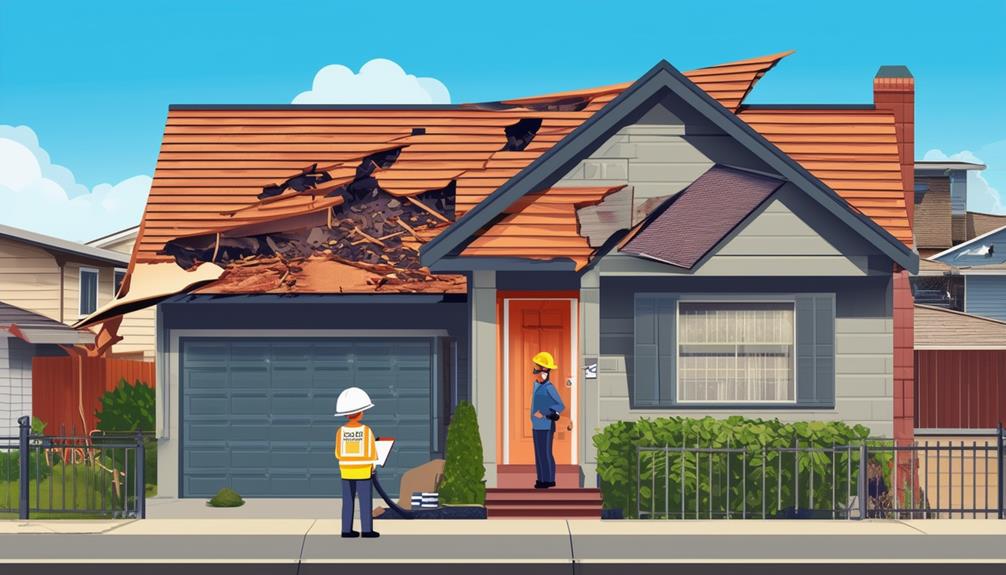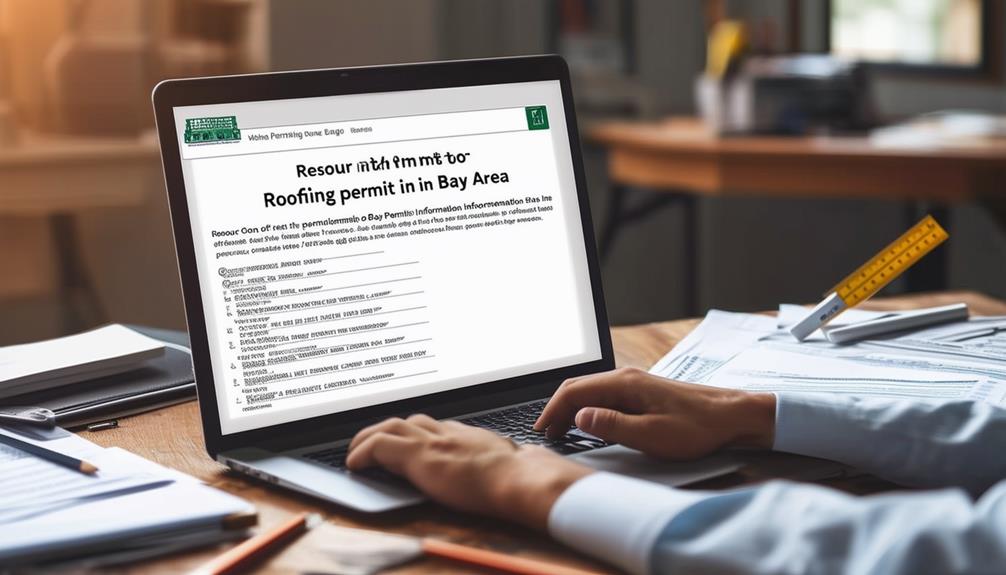When planning roofing projects in the Bay Area, adhere to strict regulations for safety. Permits are essential for minor repairs, re-roofing, solar panel installations, and more. Guarantee local building department confirmation and compliance with ordinances. Collect essential documents like architectural plans and property ownership proof. Deadlines and fees must be met promptly. Expect varying approval timelines based on project complexity. Comply with common roofing regulations, material restrictions, and inspection procedures diligently. Hire licensed contractors for quality workmanship and permit validity. Understand code violations to avoid setbacks. For more detailed information on Bay Area roofing permits and regulations, refer to the complete research data.
Bay Area Roofing Permit Requirements

Understanding the specific Bay Area roofing permit requirements is essential before starting any roofing project in the region. The Bay Area has stringent regulations in place to guarantee the safety and quality of roofing installations. When it comes to permit exemptions, it is important to note that certain minor repairs or replacements may not require a permit, such as replacing up to 100 square feet of roofing material. However, it is important to check with your local building department to confirm if your project qualifies for an exemption.
Local ordinances play a significant role in determining the specific requirements for roofing permits in the Bay Area. These ordinances outline the rules and guidelines that must be followed when undertaking a roofing project. They cover aspects such as the types of materials that can be used, the structural requirements for the roof, and the necessary inspections that need to be conducted throughout the project. It is important to familiarize yourself with these ordinances to ensure full compliance with the Bay Area roofing permit requirements.
Types of Roofing Permits Available
Different types of roofing permits are issued in the Bay Area to regulate various aspects of roofing projects and guarantee compliance with local regulations. When planning your roofing project, it's important to understand the permit types available and their eligibility criteria to ensure a smooth process. Here are some key permit types to take into account:
- Minor Roof Repair Permit: Suitable for small-scale repairs like fixing leaks or replacing a few shingles.
- Re-Roofing Permit: Required for complete roof replacements or significant alterations to the existing roof structure.
- Solar Panel Installation Permit: If you plan to install solar panels on your roof, a separate permit may be necessary.
- Green Roof Permit: For projects involving the installation of environmentally friendly green roofs.
- Emergency Roofing Permit: In case of unforeseen damage requiring immediate repairs, an emergency permit may be granted.
Understanding the permit expiration dates and renewal procedures is important to avoid any disruptions during your roofing project. Regularly check the status of your permits and make sure to renew them in a timely manner to stay compliant with local regulations.
Permit Application Process Overview

To begin the process of obtaining a roofing permit in the Bay Area, gather all necessary documents such as architectural plans, engineering drawings, and proof of insurance. Be mindful of submission deadlines and required fees, as missing these could delay the approval process. Expect an approval timeline that varies depending on the complexity of the project and the workload of the local building department.
Required Documents for Permits
Make sure to gather all necessary documents before starting the permit application process for roofing projects in the Bay Area. When applying for a roofing permit, you must make certain that you have the required documentation to streamline the process efficiently. Here are the essential documents you will need:
- Property Ownership Proof: A property deed, tax bill, or another official document proving ownership.
- Roofing Plans: Detailed plans showing the scope of the roofing project, including materials and structural details.
- Contractor's License: A valid contractor's license to perform roofing work in the Bay Area.
- Insurance Certificate: Proof of liability insurance coverage to protect against any potential damages or accidents.
- Structural Engineer's Report: In some cases, a report from a structural engineer may be necessary to ensure the roof's stability and compliance with building codes.
Having these documents ready will facilitate a smoother permit application process and confirm compliance with the regulations in the Bay Area.
Submission Deadlines and Fees
Timely submission and accurate fee payments are essential aspects of the permit application process for roofing projects in the Bay Area. Submission deadlines must be strictly adhered to. Failure to meet these deadlines can result in delays in the processing of your permit. The Bay Area offers various payment options to guarantee convenience for applicants. Payments can usually be made online, in-person, or via mail. Late penalties may be imposed for submissions that miss the specified deadlines. It is important to review and understand the fee structure to avoid any surprises. However, in certain circumstances, fee waivers may be available for qualifying individuals or projects. Understanding the submission deadlines and fee payment options will not only expedite the permit application process but also prevent unnecessary delays and additional costs. Be diligent in meeting deadlines and ensure accurate fee payments to facilitate a smooth application process.
Approval Timeline Expectations
Meeting approval timeline expectations is essential for successfully navigating through the permit application process efficiently and effectively in the Bay Area. To guarantee a smooth process, consider the following key points:
- Permit Processing Timelines: Familiarize yourself with the typical processing times for roofing permits in the Bay Area. Understanding these timelines will help you plan your project accordingly.
- Regulatory Compliance Expectations: Stay informed about the regulatory requirements and compliance standards that apply to roofing projects in the Bay Area. Adhering to these regulations is vital for a successful permit application.
- Documentation Preparation: Gather all required documentation promptly to avoid delays in the approval process. Missing or incomplete documents can have a significant impact on the timeline.
- Communication with Authorities: Maintain open communication with the relevant authorities throughout the permit application process. Addressing any queries or requests for additional information promptly can expedite the approval timeline.
- Follow-Up Procedures: Familiarize yourself with the follow-up procedures after submitting your application. Knowing what to expect post-submission can help you anticipate the approval timeline accurately.
Common Roofing Regulations to Follow
Guarantee compliance with local building codes by familiarizing yourself with the common roofing regulations that apply in the Bay Area. Understanding and adhering to these regulations is essential for a successful roofing project. To begin with, make sure that your roofing project undergoes a thorough roofing inspection. Inspections are necessary to verify that the roof is installed correctly, meets safety standards, and complies with local regulations. Failure to pass inspection may result in delays or fines. Additionally, be mindful of permit renewal requirements. In the Bay Area, roofing permits typically need to be renewed periodically to ensure that the work being done aligns with current regulations. Failure to renew permits can lead to legal issues and the halting of your project. By staying informed about roofing inspection procedures and permit renewal deadlines, you can avoid costly setbacks and ensure that your roofing project proceeds smoothly within the bounds of the law.
Roofing Material Restrictions in Bay Area

Guarantee compliance with local regulations in the Bay Area by being aware of the specific roofing material restrictions that apply to your project. When it comes to roofing material selection, it is important to take into account not only the aesthetics but also the environmental impact and adherence to local guidelines. Here are some key points to keep in mind:
- Asphalt Shingles: While commonly used, certain areas in the Bay Area may have restrictions on the type or color of asphalt shingles due to environmental concerns.
- Wood Shakes: Some regions have limitations on the use of wood shakes due to fire safety regulations, so make sure to comply before selecting this material.
- Metal Roofing: Increasing in popularity due to its longevity and energy efficiency, metal roofing may have specific installation requirements in different Bay Area municipalities.
- Tile Roofing: Heavy in weight, tile roofing materials may require structural reinforcement and approval before installation.
- Cost Comparison: Take into account not only the upfront cost but also the long-term maintenance expenses associated with different roofing materials to make an informed decision.
Inspections and Compliance Procedures
Guarantee meticulous documentation of all relevant permits and compliance with local regulations by scheduling timely inspections during key stages of your roofing project in the Bay Area. Inspection scheduling is vital to ensure that your roofing project meets all necessary requirements. Arrange for inspections at critical junctures such as before installation, after completion, and whenever significant modifications occur. Compliance follow-up is equally significant to address any issues identified during inspections promptly. Keep detailed records of all inspections and make sure that any deficiencies are rectified promptly to maintain compliance with Bay Area regulations. Failure to adhere to inspection schedules or address compliance issues can result in costly delays or even fines. By staying proactive and organized in your inspection and compliance procedures, you can mitigate risks and ensure a smooth roofing project that meets all regulatory standards in the Bay Area.
Understanding Roofing Code Violations

To guarantee compliance with roofing regulations in the Bay Area, it is essential to understand common roofing code violations and how to address them efficiently. Being aware of the potential pitfalls can save you time and money in the long run. Here are some key points to take into account:
- Improper Installation: Make sure that all roofing materials are installed according to manufacturer specifications and local building codes.
- Insufficient Ventilation: Proper ventilation is essential for the longevity of your roof and the overall health of your home.
- Exceeding Weight Limits: Be mindful of the weight capacity of your roof to prevent structural damage.
- Inadequate Drainage: Proper drainage systems are crucial to prevent water accumulation and potential leaks.
- Lack of Permits: Always obtain the necessary permits before starting any roofing project to avoid code enforcement issues and violation penalties.
Understanding these common violations will help you navigate the roofing process smoothly while staying compliant with the regulations in the Bay Area.
Importance of Hiring Licensed Contractors
Proper licensing is crucial when selecting contractors for your roofing project in the Bay Area to guarantee adherence to regulatory standards and quality workmanship. Contractor qualifications play an important role in ensuring that the individuals or companies you hire have the necessary skills, knowledge, and experience to handle the complexities of roofing installations or repairs. A licensed contractor has met specific requirements set by state or local authorities, demonstrating their competence in the field.
Moreover, permit validity is directly tied to hiring licensed contractors. Working with unlicensed individuals not only jeopardizes the quality of work but can also lead to permit violations. Permits are issued based on the understanding that the work will be carried out in compliance with building codes and regulations. Hiring a licensed contractor ensures that the work done on your roof meets these standards, reducing the risk of potential legal issues or safety hazards down the line. Remember, always verify a contractor's license and qualifications before entrusting them with your roofing project.
Resources for Roofing Permit Information

To start maneuvering the process of obtaining roofing permits in the Bay Area, you must first acquaint yourself with the permit application process. This involves understanding the specific documentation requirements outlined by the local building department. Making sure you have a thorough checklist of all necessary documents will help streamline the permit application process and ensure compliance with regulations.
Permit Application Process
Find detailed information on obtaining roofing permits in the Bay Area through the official websites of local building departments and permit offices. When applying for a roofing permit, it is important to adhere to the specific guidelines set forth by each jurisdiction within the Bay Area. Here are some essential points to keep in mind during the permit application process:
- Permit Application Form: Complete the required permit application form accurately and provide all necessary information.
- Fee Structure: Understand the fee breakdown for the roofing permit, including any additional charges that may apply.
- Submission Method: Determine the accepted methods for submitting your permit application, whether in person, by mail, or online.
- Review Process: Familiarize yourself with the permit approval process and the timeline expectations for receiving a decision.
- Contact Information: Note down the contact details of the relevant permit office or building department in case you have any queries or need assistance.
Required Documentation Checklist
Guarantee thorough compliance with roofing permit regulations in the Bay Area by assembling all necessary documentation according to the official guidelines provided by local building departments and permit offices. When applying for a roofing permit, it is important to make sure that you have all the required documentation in order. The permit application process typically involves submitting specific documents to demonstrate compliance with building codes and safety regulations. Common documentation requirements include detailed roof plans, material specifications, structural engineering reports, and proof of contractor licensing and insurance.
Additionally, you may need to provide a copy of the property's site plan, showing the location of the proposed roofing work. Detailed cost estimates and project timelines are often necessary to accompany the permit application. It is crucial to carefully review the documentation checklist provided by the local building department to avoid delays or rejections. By meticulously gathering all the required documents upfront, you can streamline the permit approval process and ensure that your roofing project proceeds smoothly and in full compliance with Bay Area regulations.
Frequently Asked Questions
Can I Install Solar Panels on My Roof Without a Permit?
You cannot install solar panels on your roof without a permit. Solar panel regulations typically require obtaining a permit before installation. However, some jurisdictions may offer permit exemptions for certain scenarios, such as small-scale installations or specific types of buildings. It is important to research and comply with the local regulations to make sure that your solar panel installation is legal and meets all necessary requirements.
Are There Any Restrictions on the Color of Roofing Materials?
You can choose from a variety of roofing material colors, but it's crucial to check for any HOA restrictions. Some homeowner associations have guidelines on acceptable colors to maintain a cohesive look within the community. Confirm that your chosen color complies with these regulations to avoid any issues. Before making a decision, review your HOA's rules regarding roofing material colors to stay in line with their requirements.
What Happens if I Fail a Roofing Inspection?
If you fail a roofing inspection, repercussions can range from fines to stop-work orders. The consequences of failing a roofing inspection can delay your project and incur additional costs. After failing, a reinspection will be necessary to guarantee compliance with regulations. The process after failing a roofing inspection involves addressing the deficiencies noted during the initial inspection and correcting them before the reinspection. It's essential to rectify any issues promptly to avoid further setbacks.
Do I Need a Permit to Replace a Small Section of My Roof?
If you're replacing a small section of your roof, you may be eligible for permit exemptions depending on local regulations. Always check the specific roofing regulations in your area to guarantee compliance. Permit exemptions for minor repairs can save time and money, but it's vital to understand the criteria and limitations set by the authorities. Stay informed about any permit requirements to avoid potential issues during your roof replacement process. Additionally, understanding the rules surrounding permit exemptions can help you plan your project more efficiently and avoid unnecessary delays. For larger roofing projects that do require permits, it’s worth exploring financing options for roof replacement to help manage costs over time. These options can provide flexible payment plans, making it easier to address your roofing needs without compromising your budget.
Can I Perform Roofing Work on My Own Home Without a License?
When it comes to DIY risks and homeowner responsibilities, performing roofing work on your own home without a license can lead to legal issues and safety concerns. It's essential to understand the complexities of roofing projects and the potential hazards involved. Without proper training and licensing, you may compromise the structural integrity of your roof, risking costly damages and personal injury. Always prioritize safety and compliance by hiring qualified professionals for roofing work.
Conclusion
In summary, obtaining a roofing permit in the Bay Area is essential for ensuring compliance with local regulations and building codes. Did you know that according to a recent study, 80% of roofing projects in the Bay Area require a permit? By following the permit application process, adhering to regulations, and hiring licensed contractors, you can guarantee a safe and successful roofing project. Stay informed and prepared to navigate the complexities of roofing permits in the Bay Area.




